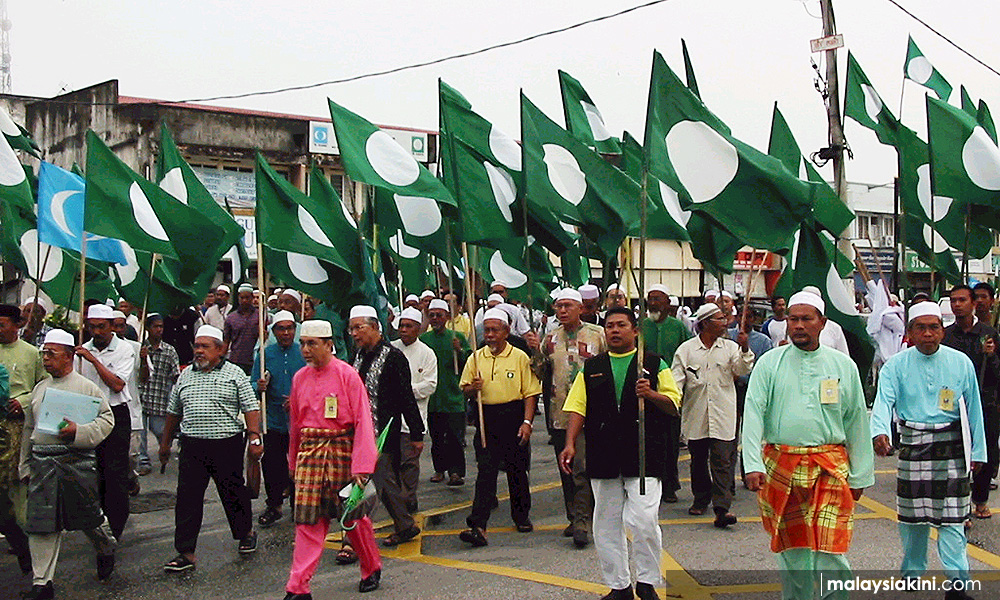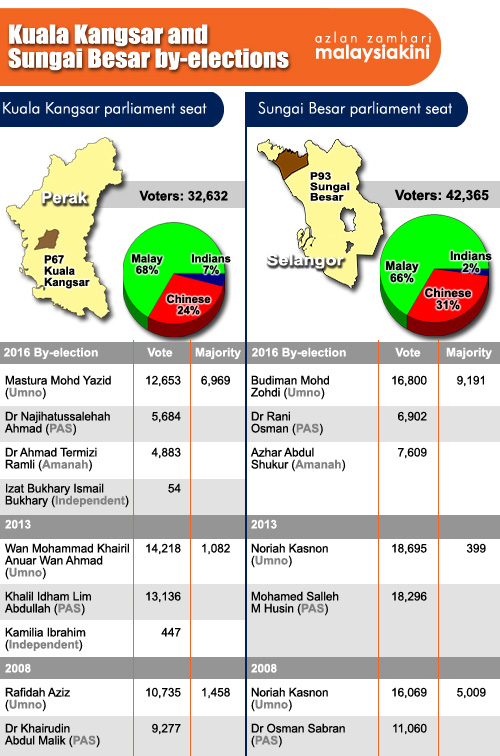
QUESTION TIME | For a simple illustration of how opposition parties/coalitions like PAS and Pakatan Harapan will be decimated if they don’t at least have an electoral pact not to contest against each other, one only has to look at the parliamentary by-election results at Sungai Besar and Kuala Kangsar over a year ago (see graphic).

This of course assumes that PAS does not have an electoral pact or alliance with Umno under which they do not contest against each other. If they do, then it is a straight fight between Umno/PAS on one side and Pakatan Harapan the other, ignoring independents.
With PAS and Amanah (the PAS breakaway faction) splitting the Malay votes, Umno easily won by much increased majorities in both places - 6,969 for Kuala Kangsar and 9,191 for Sungai Besar. This is despite former prime minister Dr Mahathir Mohamad’s intense campaigning in both places.
Now total up both Amanah’s and PAS’ totals in each of the constituencies and Umno’s majority falls to 2,086 in Kuala Kangsar and 2,289 in Sungai Besar, which is still significantly higher than the 2013 majorities of 1,082 and just 399 respectively.
To illustrate the almost impossible task of a divided opposition winning these two seats, let us calculate the swing required for this to happen. For this, we assume the swing votes go equally to PAS and Amanah to make calculations easier.
The Kuala Kangsar majority is 6,969, with PAS the first trailer. PAS will require 3,485 votes (6,969 divided by two plus one) from Umno to win. That means 3,485 votes will also go to Amanah, under our assumption, a swing vote of 6,970. That is 30 percent of total votes cast for the three parties of 23,220.
That means three out of 10 of those who voted for Umno previously must now switch their votes to the opposition PAS and Amanah, a kind of swing that is so big even in the current circumstances that no one expects it will happen.
A similar calculation for Sungai Besar requires 9,192 votes to swing to the opposition, in this case Amanah, or 29.4 percent of total votes cast for the three parties in the by-election of 31,311 votes, close to the 30 percent for Kuala Kangsar.
If we use GE13 figures for Kuala Kangsar, when PAS was part of the coalition, a swing vote of less than two percent will do it. And even less than that for Sungai Besar.
Repeat this scenario for all the three-cornered fights in Peninsular Malaysia and the prognosis for the opposition is extremely bad. Why, it may be completely knocked out, let alone win in the next general election.
If there is no electoral pact and PAS is in the opposition, PAS and PKR will destroy each other. The only winner may be DAP, which can count on the Chinese votes, although its Malay support will dwindle even more. The DAP, which has been notoriously anti-PAS, will hand over power to a new, revitalised Umno, perhaps even a two-thirds majority to BN.
But even the DAP, a strong opponent of working with PAS, should not be smug. With PAS competing in three-cornered seats with a Chinese majority or large population of Chinese, the total lack of Malay support, of which the opposition portion is likely to go to PAS, could make the difference between winning and losing for DAP.
Shortsighted policy
Not having an electoral pact with PAS will mean unmitigated disaster for all the opposition parties, which makes it rather shortsighted for Pakatan Harapan to declare recently that it will not work with PAS. That does not mean that PKR can’t.
An electoral pact does not necessarily mean being part of the coalition - all it means is that the major opposition parties - DAP, PKR, PAS and Amanah, I don’t consider Bersatu a major party yet with just one seat - don’t contest against one another. And it will be possible to show to PAS that three-cornered fights will be extremely damaging to it too.
While DAP and others in PKR are okay with working with Mahathir and even support him and his party Bersatu, where the membership is purely racial, why is it they can’t even consider an electoral pact with PAS when that is so much more valuable?
What does PAS bring to the table? In the last election it won 21 seats, PKR, 30 and DAP, 38, to help form the 89 opposition seats. What does Bersatu bring to the table? One seat, that of former deputy prime minister Muhyiddin Yassin. Its pull was so little that it could get just one other seat - a state seat, that of Mahathir’s son Mukhriz. Yet, talk is that Bersatu could contest over 20 seats and is asking for 80!
So much more preference is given to Mahathir who, at least from the opposition’s point of view was a horrible prime minister, under whose hands some of the major current leaders of the opposition suffered and the rights of the rakyat took a beating. If Mahathir is okay for the common opposition move to oust Najib Razak, why can’t PAS be okay as well?
The split in the opposition is becoming rather obvious already with GE14 said to be just around the corner. Cooler thinking should prevail to consider, at the very minimum, an electoral pact.
Otherwise, as the analysis shows, you can pretty much say goodbye to any reasonable chance of an opposition victory. And the opposition may well be staring at BN regaining the two-thirds majority in Parliament that it lost in 2008.
P GUNASEGARAM says compromise requires accommodation, not adamant, irrational positions and self-interest. E-mail: t.p.guna@gmail.com. - Mkini
No comments:
Post a Comment
Note: Only a member of this blog may post a comment.